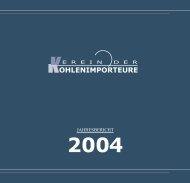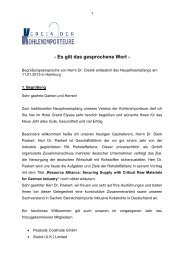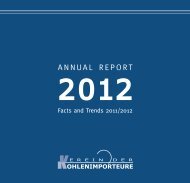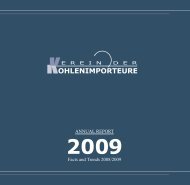Annual Report 2010 - Verein der Kohlenimporteure eV
Annual Report 2010 - Verein der Kohlenimporteure eV
Annual Report 2010 - Verein der Kohlenimporteure eV
You also want an ePaper? Increase the reach of your titles
YUMPU automatically turns print PDFs into web optimized ePapers that Google loves.
56 <br />
According to information from BDEW, German<br />
<br />
renewable electricity, i.e. approximately € 0.156/kWh.<br />
The market value of EEG power amounts to about €4.5<br />
billion, so direct subsidies totalled €8 billion in <strong>2010</strong>.<br />
The support of renewable energy sources is moving<br />
away from start-up financing for new technologies<br />
towards permanent subsidy by consumers. This<br />
financing is increasing and is far in excess of the<br />
subsidies for German hard coal mining.<br />
In consequence, electricity tariffs increased for German<br />
households as follows:<br />
Averaged monthly electricity bill of a<br />
three-person-household (3,500 KWh/a) in euro<br />
37,60 33,80<br />
Electricity Bill for Households<br />
49,95 48,20<br />
26,53 28,57<br />
12,35<br />
14,40<br />
18,67<br />
20,30<br />
20,82 21,70 22,49 24,65<br />
25,20<br />
40,66 41,76<br />
15,51 16,68<br />
46,99<br />
50,14 52,38 54,43 56,76 60,20 63,15 67,70 69,10<br />
25,15 25,08 28,32 29,84 31,56 32,73 34,27 35,55 37,95 41,17 40,53<br />
1998 1999 2000 2001 2002 2003 2004 2005 2006 2007 2008 2009 <strong>2010</strong><br />
Production, transport, distribution<br />
Figure 28 Source: BDEW, status 01/2011<br />
40% of the total support for renewable electricity<br />
generation went to solar energy in <strong>2010</strong><br />
Subsidies for solar energy – at unimaginably high<br />
levels – were only half-heartedly reduced after much<br />
<br />
reductions for many of the components used in solar<br />
power generation, due to increased competition, mainly<br />
from China. A “subsidy bubble” is still developing,<br />
without making any major contribution to power supply<br />
or reduction of CO 2 emissions. Even with less support,<br />
at €0.29/kWh since the beginning of 2011, this kind of<br />
power generation is still six times more expensive than<br />
the traded price per kWh seen on the power exchange.<br />
Solar power covered barely 2% of Germany’s total<br />
electricity demand in <strong>2010</strong>. However, it received<br />
approximately €3.3 billion from the feed-in levy.<br />
According to initial projections, <strong>2010</strong> was a record year<br />
for new connections of photovoltaic installations.<br />
Changes compared<br />
with 1998<br />
+ 38 %<br />
+ 131%<br />
+ 8%<br />
Taxes, fees, costs<br />
(Renewable energies act, cogeneration act, electricity tax,<br />
licence fee, VAT)<br />
<br />
A capacity of more than 18,000 MW could be reached<br />
in 2011. The “solar debt” of citizens probably reaches<br />
over €120 billion over the next twenty years, which<br />
must be amortised via electricity bills. This sum is<br />
similar in size to the cost of the measures to rescue the<br />
banks or to stabilise the euro. As solar energy subsidies<br />
are mainly used by well-off citizens, who can afford








